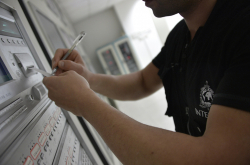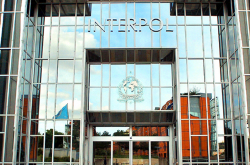LYON, France – The heads of INTERPOL and the G5 Sahel have signed an agreement which will see increased information sharing to better address current and emerging terrorist threats across the region.

The growing number of violent and increasingly sophisticated extremist groups across the Sahel - Burkina Faso, Chad, Mali, Mauritania and Niger - has resulted in the death of thousands of individuals, with hundreds of thousands more displaced.
In particular Burkina Faso has seen the growth of extremist violence over the last few months, most recently on 12 May when an attack on a church in Dablo left six dead, just two days after the release of four hostages in the northern part of the country by French special forces.
To help prevent these threats from gaining power or spreading into other countries, the memorandum of understanding signed by INTERPOL Secretary General Jürgen Stock and Permanent Secretary of the G5 Sahel Maman Sambo Sidikou, will enable technical cooperation, training, capacity building and exchange of expertise.
Funding by Germany’s Foreign Office will support expansion of INTERPOL’s network and capabilities as well as developing criminal analysis throughout the region.
“The security challenges facing the G5 Sahel countries continue to grow. INTERPOL is stepping up to provide additional assistance to law enforcement across the region, thanks to the financial support from Germany,” said Secretary General Stock.
“Whilst the agreement we have signed focuses on these five countries, INTERPOL’s global reach will help ensure that any relevant information or expertise from around the world can be accessed and used to support local investigations,” added the INTERPOL Chief.

Accompanied by Jean Bosco Kienou, President of the G5 Sahel Committee for Defence and Security and Director General of the Burkina Faso National Police, Permanent Secretary Sidikou welcomed the agreement as an important part of the ongoing efforts to enhance security.
“Uniting the work of the G5 Sahel and INTERPOL will help address terrorism and organized crime which severely impact the day-to-day lives of people throughout the region,” said Mr Sidikou.
“The G5 Sahel has huge economic potential, which if it is to be fully realised means we need to help these countries develop and maintain their safety and security,” added the Permanent Secretary.

Under the agreement, the G5S Permanent Secretariat will be connected to INTERPOL’s secure communications network. This will enable direct sharing of terrorist-related information between the G5, INTERPOL’s General Secretariat headquarters, its National Central Bureaus, and the G5 Security Cooperation Platform.
INTERPOL projects, including MiLex (Military to Law Enforcement exchange), Watchmaker (Identifying and tracking individuals involved in the manufacture or use of explosives) and FIRST (Facial, Imaging, Recognition, Searching and Tracking) are also among the key areas for development at the national level across the G5 Sahel countries.
Biometric information gathered and shared via Project FIRST has already resulted in matches between previously unconnected individuals within the Sahel and beyond.








